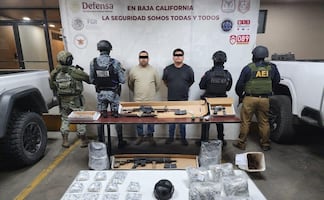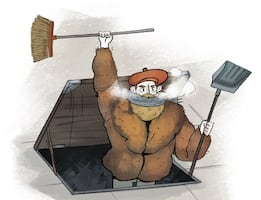Every day, migrants who work in companies from the milk industry in the U.S. face sexual harassment, non-stop working days, threats, deportation, and even being sued by employers.
The conflict between workers and business leaders from the milk industry dates back to 2009 when 12 workers sued their bosses from the Ruby Ridge dairy farm , located in Washington , also known as the Darigold case.
Since then, the migrants who work at farms have made their complaints and working conditions public through the United Farm Workers . Some of their cases have made it to U.S. courts w here they have achieved small triumphs, which are used by the UFW to invite those who have been victims of abuse in the dairy industry to file lawsuits and demand the respect of human rights.
Some of the companies that have been embroiled in these conflicts belong to the Northwest Dairy Asociation (NDA) , an organization formed by almost 440 companies from Oregon, Washington, Idaho , and Montana .
Nevertheless, the NDA has found no evidence to support the allegations made by the employees. The association told EL UNIVERSAL that farm workers work between 8 and 12 hours every day, depending on their shift.
The NDA claims the employees they have contacted say that they have one or two days off every week but that many of them prefer to work overtime to make more money .
The salaries vary and range between USD $7.25 to USD $12 per hour . The more experienced workers can earn over USD $20 per hour, besides their work benefits.
In previous days, the vice president of the UFW, Erik Nichol son traveled to Mexico to meet with federal government officials and explain the abuse Mexican migrants are subjected to in dairy farms. He asked the Mexican government to step in through the Foreign Affairs Ministry to make sure that Mexican migrants are working in proper conditions and that their labor rights are respected.
Nicholson
also met with Bertha Alicia Caraveo Camarena, Morena , to asked for more information about the conditions of Mexican workers in dairy farms.
“The main focus is the Darigold case, as well as the work conditions of Mexican migrants in the U.S. They seem very interested in learning more about the issue and requested more information,” Nicholson said.
He also met with Jacob Prado , the general director of the institution to Protect Mexicans Abroad , under the Foreign Affairs Ministry.
“Through the office of ambassador Prado , we hope to get to Marcelo Ebrard because we've been told that he is the right person to help Mexicans abroad. The trial begins on May 20, so we hope that before that date, the government says something in regards to this,” the UFW leader said.
The Ruby Ridge Case
The case of the 12 workers fired and sued by Ruby Ridge dairy farm took place in the Spring of 2009 and sparked a movement called #WeAreMoreThan12.
The workers demanded that Ruby Ridge improved the working conditions and claim this is the reason why they were fired. A year later, the farm sued them for defamation and conspiracy.
The company is demanding around USD $1.5 million , as it claims some of the workers tried to damage the farm and the cows .
Moreover, the NDA is the owner of Darigold , a company that does not have its own dairy farms but owns 11 factories where they produce other dairy products that are then exported to other countries, including Mexico .
Although no complaint was filed against Darigold directly, the UFW explains that the company is responsible for providing proper working conditions for its employees.
According to Erik Nicholson , this case involving 12 workers has frightened others: “This is a very strong message for the community of workers because now they are afraid of denouncing problems and the violations of their labor rights because they can not only fire them and deport them, but they are also at risk of being sued,” he said.
“We have demanded Darigold to take responsibility but its answer has always been a no.”
One of the demands made by the UFW is to regulate the responsibility of dairy farms in case of deaths since Nicholson affirms that the risks faced by migrants are unique.
Harassment
María González
, a Mexican migrant and activist , was the victim of sexual harassment in 2015 while she worked at DeRuyter Brothers Dairy .
Her attacker, a U.S. citizen , verbally and physically attacked the woman.
“He started to tell me how nice I smelled, how good my pants looked, there were a lot of compliments about how he would like (to be with) a woman like me and things like that. Then it became physical ,” María told EL UNIVERSAL.
“The first time he tried to touch me was in the farmyards when I had an accident and I was doing more moderate work. He used that as an excuse to try to rub my back, claiming I would feel better but I didn't allow it and he kept on insisting got another three or four days.”
María reported the incident but her boss was her harasser 's brother-in-law and the situation only worsened.
“He was more aggressive with me, he touched me more, he closed his fist and pretended he was going to punch me and once he was close to my face he stopped, he pulled my hair (…), he threatened me with killing me and my family ,” she said.
She added that these situations happen in dairy farms every day and that women aren't aware that these attitudes and actions are harassment and they refuse to file complaints because they are afraid.
“Everyone wants to file complaints but they are really scared, they are in a panic because it is very hard to take that step, I perfectly understand them.”
María was fired in September 2015 because she refused to work with her harasser . She sued the company and in 2018 it paid her USD $95,000 for emotional distress and USD $5,000 for unpaid wages.
Life changing accidents
Although Josefina Luciano had more experience in the fields, she decided to join the dairy industry in 2015. Nevertheless, luck wasn't on her side and she is currently immersed in a l egal battle against a dairy farm because she is now handicapped after an accident took place while she was milking a cow.
In 2017, she started working at a farm owned by the NDA but one day, a cow kicked her in the face while she was milking it.
Her teeth fell off, some of them fractured and in December 2018, she was given dental implants.
“I haven't been able to go back to work, besides the fact that the cow fractured my teet h, it also moved th ree discs on my neck and now I have arthritis and depression , I'm still trying to get over it but there are days when I don't feel like myself,” she said.
“I have constant headaches, dizziness, vertigo, neck pain, and a tingling sensation on my hands, I have lost the strength in them, sometimes I drop even a glass or I can't even open a water bottle, my neck swells and I have become very slow because I'm not as agile as before.”
The company's insurance paid for the dental treatment and a year later, it agreed to pay for her depression treatment.
gm
Noticias según tus intereses
[Publicidad]
[Publicidad]















